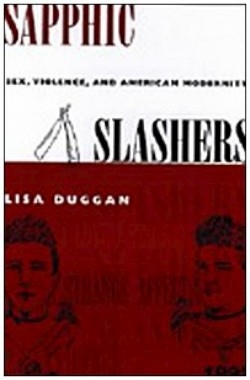Sapphic Slashers
Sex Violence and American Modernity
Marshall McLuhan said it and Duggan confirms it: the medium is the message. Harkening back to the late nineteenth century, Duggan traces the development of the national press. She analyzes the way wide-circulation newspapers created a common ethos by teaching monied, white Americans an allegedly natural pecking order: caucasians over people of color, men over women, heterosexuals over homosexuals, and Christians over Buddhists, Muslims and Jews.
“As networked publishers selected local stories to circulate as bearers of national significance, cultural narratives of the nation emerged to define the boundaries, preoccupations, and exclusions of Americanness at the turn of the century,” Duggan writes. To prove her point, she takes two seemingly disparate stories—the lynching of “black rapists” and the emergence of the “homicidal lesbian”—and demonstrates the way news coverage of both influenced public opinion. The near-constant portrayal of black men as predators intent on the sexual violation of white women, she reports, rationalized lynching and legitimized the stark inequalities governing a century of race relations. Likewise, the tale of the lesbian love turned violent served to hammer home the need for a paternalistic domestic order.
Duggan hones in on particular cases—the mistreatment of African-American journalist and activist Ida B. Wells, the killing of dozens of African-American men accused of rape and the knifing of eighteen-year-old Freda Ward by her teenaged lover, Alice Mitchell. Although the Mitchell-Ward case gets the lion’s share of the writer’s attention, Duggan’s gaze never veers from what she calls the creation of “American modernity.” How the case was used to demonstrate the perceived insanity of a “mannish” woman wishing to play “husband” to her girlfriend / “wife,” makes for fascinating reading.
Journalists, Duggan concludes, were unable to fathom the defiance of gender norms; similarly, the press made it appear unthinkable for white women to freely choose black men as lovers or partners. In a world shaped by media, lesbians had to be crazy and black men had to be rapists since neither miscegenation nor homosexuality were acceptable options.
Sapphic Slashers—albeit academic and somewhat dense—is an insightful look at the politics of social construction. Reading it opens up the world and puts the creation of mass culture in historical perspective.
Reviewed by
Eleanor J. Bader
Disclosure: This article is not an endorsement, but a review. The publisher of this book provided free copies of the book to have their book reviewed by a professional reviewer. No fee was paid by the publisher for this review. Foreword Reviews only recommends books that we love. Foreword Magazine, Inc. is disclosing this in accordance with the Federal Trade Commission’s 16 CFR, Part 255.

